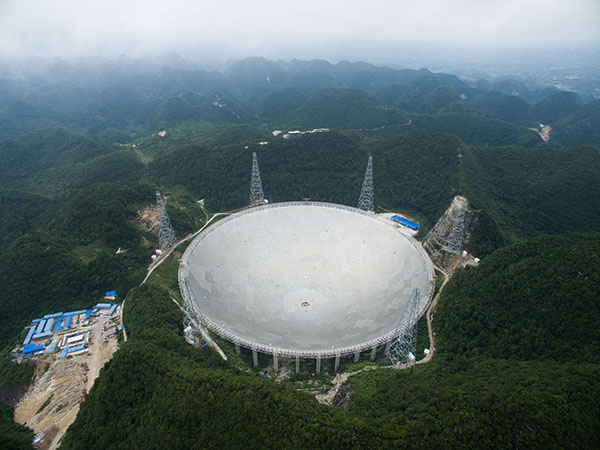 |
|
FAST, the world's largest and most sensitive radio telescope, is nestled in a mountainous area of Guizhou province. [Photo provided to China Daily] |
The depression was a 45-million-year-old basin, with its karst geology providing natural protection for the telescope.
"This location was the best out of over 300 candidate sites," Nan said at the time.
In March 2011, construction of the giant telescope began. As the chief scientist and chief engineer, Nan had to deal with some tough civil engineering problems.
"For the telescope, we had to conduct research into the topography, construction and hydrogeology of the site," Nan said.
Nan had to climb up and down 100-meter-tall towers via narrow stairways countless times and assess the firmness of the subsoil with his own feet.
From calculating the length of each cable to the precise installation of each reflective panel, Nan took care of numerous technical details.
Jiang Peng, Nan's assistant, says most of the scientists working with the FAST project specialize in different fields, such as astronomy, mechanics and radio technology.
"But Nan knew everything," Jiang says. "This giant complicated radio telescope project was made for him."
The cable-net construction of the inverted dome of the telescope was another challenge thrown at Nan-the structure was made up of a network of more than 10,000 cables that held together 4,450 individual reflective panels.
When it came to problem solving, Nan and his team had no reference points to turn to, and nowhere to ask for help.
Nan was always at the forefront of trials during the construction process. "During every failure, Nan was there, trying to find out a solution," Jiang says.
Often dressed in jeans and sporting a neat mustache, Nan didn't look much like a scientist on site. And the down-to-earth scientist also had a soft heart.
When Nan first visited the FAST location, he met some local children with big smiles dressed in worn-out clothes. He started to give them money to help support their lives.
After finding out that many of the construction workers were from impoverished mountainous areas, Nan also bought clothes for them.
Nan always wore a blue helmet with his name on it when he was working at the construction site. Every villager, and even a local dog, knew him.